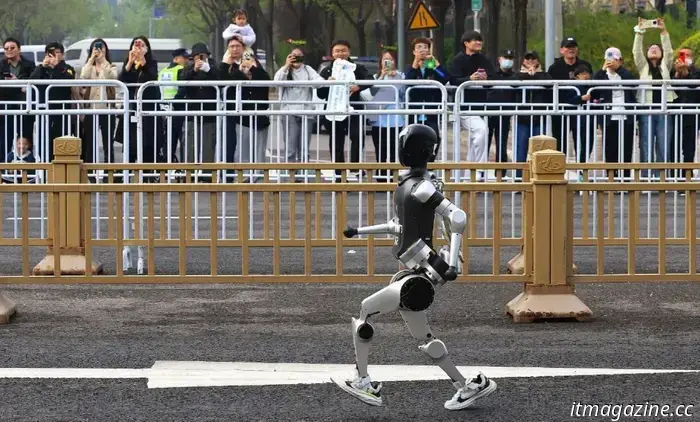
Beijing is the venue for the inaugural half-marathon for humanoid robots, with Tiangong Ultra finishing the race in two hours and 40 minutes.
Credit: CCTV
On Saturday, the inaugural half-marathon for humanoid robots took place in Beijing. This event, which combined technology and sports, featured 20 teams from Chinese universities, companies, and research institutions, alongside approximately 12,000 human participants. The Tiangong Robot Ultra, created by the Beijing Humanoid Robot Innovation Center, completed the 21-kilometer course in two hours and 40 minutes, maintaining a consistent speed of seven to eight km/h, thus securing first place.
Significance: The race aimed to highlight a pivotal moment for humanoid robots by advancing essential technologies such as joint heat resistance and environmental awareness in various conditions. However, the performance of certain robots raised concerns about their commercialization prospects. Despite challenges related to cost, energy efficiency, and reliability, embodied AI continues to represent a promising long-term field in China.
Details: The robot racecourse was separate from the human track, but ran parallel to it. The race was livestreamed by the state-owned broadcaster CCTV on the Chinese social media platform Weibo. Teams were allowed to swap out batteries or switch to backup robots, incurring a 10-minute time penalty for doing so. To assess the robots’ adaptability and consistency, the course included different types of terrain, such as flat surfaces, nine-degree slopes, gravel, and grass.
Tiangong Ultra, developed by the Beijing Humanoid Robot Innovation Center—collaboratively established by UBTECH, Xiaomi, and other partners—took the lead. Standing 1.8 meters tall and weighing 55 kilograms, the robot can achieve a maximum speed of 12 km/h. Its lightweight design, along with integrated joints and an air-cooling system, helps prevent joint overheating during extended runs. With three battery changes throughout the race, Tiangong Ultra successfully finished the 21-kilometer track in two hours and 40 minutes.
Unitree Robotics addressed the concerns surrounding the performance of its G1 robot in the half-marathon by clarifying that it did not compete in the event. Footage showing a G1 robot collapsing shortly after the race began became one of the many viral clips online.
“Some third-party teams operated the robot, which fell at the start due to mishandling. Our company has not participated in any recent robot competitions as we are currently focused on preparing a humanoid robot combat livestream project,” stated Unitree Robotics. They elaborated that such events require extensive preparation over several months and, due to commitments in ongoing research, development, and commercialization, they did not assemble an official team for the race.
Context: In January, Unitree Robotics attracted considerable attention after its humanoid robot H1 performed at the 2025 CCTV Spring Festival Gala, demonstrating agility and coordination during a dance sequence. This marked the first time many viewers witnessed Chinese robots in a mainstream performance. The company plans to launch the world’s first humanoid robot combat livestream between late April and early May, aiming to showcase advanced movements such as boxing and side flips.
Jessie Wu is a tech reporter based in Shanghai, covering consumer electronics, semiconductors, and the gaming industry for TechNode. You can connect with her via e-mail: [email protected]

Other articles
 The showrunners of The Last of Us discuss the transformative second episode of season 2.
There's no turning back as season 2 of The Last of Us arrives at a pivotal point in the narrative.
The showrunners of The Last of Us discuss the transformative second episode of season 2.
There's no turning back as season 2 of The Last of Us arrives at a pivotal point in the narrative.
 The Hundred Line: Last Defense Academy review: the pupil exceeds the mentor
The Hundred Line: Last Defense Academy enhances the Danganronpa concept, delivering a new and invigorating tactics RPG experience.
The Hundred Line: Last Defense Academy review: the pupil exceeds the mentor
The Hundred Line: Last Defense Academy enhances the Danganronpa concept, delivering a new and invigorating tactics RPG experience.
 Samsung is turning to iPad technology for the development of new OLED screens for automobiles.
Samsung plans to revolutionize the automotive display market by incorporating iPad OLED technology into vehicles.
Samsung is turning to iPad technology for the development of new OLED screens for automobiles.
Samsung plans to revolutionize the automotive display market by incorporating iPad OLED technology into vehicles.
 How to buy Reboot Cards in Fortnite
Have you ever forgotten to pick up a teammate's Reboot Card in Fortnite? You can now buy them in the game, and here's how you can do it.
How to buy Reboot Cards in Fortnite
Have you ever forgotten to pick up a teammate's Reboot Card in Fortnite? You can now buy them in the game, and here's how you can do it.
 A quarter of a century following its debut, The Virgin Suicides continues to embody profound humanity.
Since its premiere on April 21, 2000, The Virgin Suicides has proven to be a noteworthy debut feature by Sofia Coppola that has endured over time.
A quarter of a century following its debut, The Virgin Suicides continues to embody profound humanity.
Since its premiere on April 21, 2000, The Virgin Suicides has proven to be a noteworthy debut feature by Sofia Coppola that has endured over time.
 Answers for the NYT Mini Crossword for Monday, April 21.
The NYT Mini crossword may be significantly smaller than a standard crossword, but it's still quite challenging. If you're having trouble with today's puzzle, we have the solutions for you.
Answers for the NYT Mini Crossword for Monday, April 21.
The NYT Mini crossword may be significantly smaller than a standard crossword, but it's still quite challenging. If you're having trouble with today's puzzle, we have the solutions for you.
Beijing is the venue for the inaugural half-marathon for humanoid robots, with Tiangong Ultra finishing the race in two hours and 40 minutes.
On Saturday, Beijing hosted the inaugural half-marathon for humanoid robots. This event, which combined technology and athletics, saw the participation of 20 teams from Chinese universities, companies, and research organizations, alongside approximately 12,000 human runners competing with the robots.
